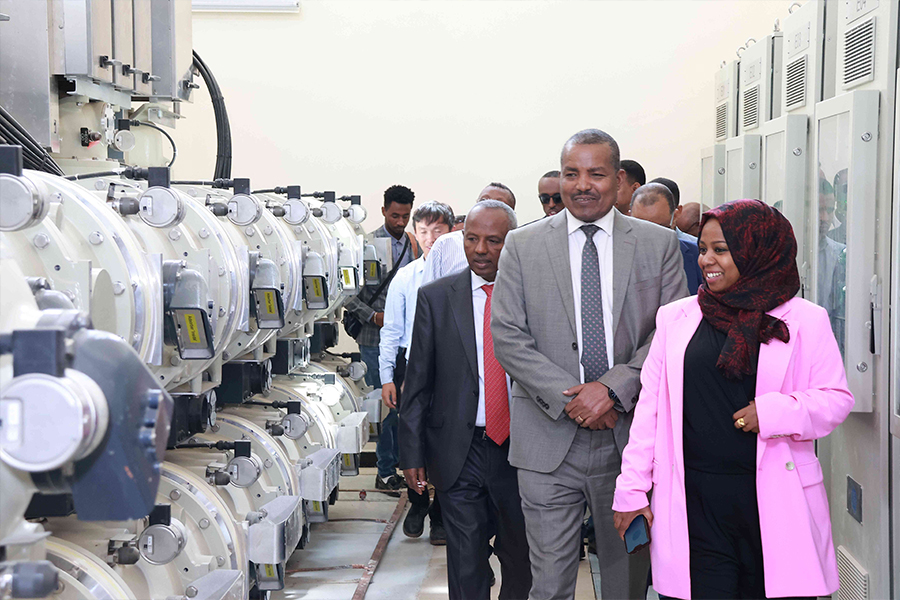
Radar | Nov 05,2022
Aug 18 , 2024
By Geremew Milkias
A country long rooted in agriculture, Ethiopia is at a defining moment in its economic history. It faces the pressing need to diversify, where there is an ongoing shift toward manufacturing and services. The key to this transformation lies in its young population, a vast resource that, if properly employed, could drive the economic ambitions.
However, high youth unemployment remains a problem made worse by the labour market's limited capacity to absorb the growing number of graduates from various institutions. Creating millions of jobs each year to keep pace with its bulging youth population requires a focus on innovation and entrepreneurship, indispensable tools for engaging young people who are eager to become active participants in the economy. Yet, for these initiatives to take root, there should be a support environment that includes bureaucratic and financial frameworks capable of nurturing entrepreneurial ventures.
Recent efforts, such as the coding initiatives led by various organisations and individuals, are commendable.
The recent agreement between the governments of Ethiopia and the United Arab Emirates (UAE) to provide basic digital literacy skills is another positive initiative toward equipping the population with the tools necessary for participation in the modern economy. However, producing a digitally literate workforce is only the beginning. To compete in the knowledge-driven economy of the 21st Century, it is imperative to focus on creating qualified professionals in the digital sector.
Globally, the business process outsourcing (BPO) industry is booming, with the market growing from 85.6 billion dollars in 2018 to an estimated 260 billion dollars this year. Projections suggest it could exceed half a trillion dollars in five years.
With its large pool of science, technology, engineering and mathematics (STEM) graduates — over 200,000 annually — Ethiopia has the potential to tap into this lucrative global market. However, more needs to be done to create an environment that attracts investment and encourages innovation. The establishment of a national innovation fund is a step in the right direction, though its approval and implementation remain to be seen.
The federal government's attempt to classify tertiary education institutions — research, applied, general, and specialised — could be considered as a positive move. However, the potential benefits of this classification could be enhanced if these institutions were more closely linked with industries, enabling an integrated national innovation system. Such a system would help address the qualification mismatches that often result in overqualified graduates lacking practical experience.
Ethiopia has attracted relatively small investments from angel investors and venture capitalists, especially when compared to its African peers. In the seven years beginning in 2015, it secured less than 100 million dollars in such investments, while neighbouring Kenya attracted around 1.28 billion dollars, Nigeria 2.07 billion, South Africa 993 million, and Egypt 800 million dollars. The disparity demonstrates the need for its leaders to create a more conducive environment for investment in startups and innovation-driven enterprises. Encouraging the establishment of angel investors and venture capital funds is crucial, particularly where traditional banks are often ill-equipped to finance businesses that rely on intangible assets.
They could leverage society's rich tradition of social financial institutions, such as Ekub and Idir, transforming them into modern, digital platforms akin to crowdfunding and crowdfinancing.
Ethiopians would benefit from developing a comprehensive national innovation system, bringing together academic institutions, industries, and policymakers to support and drive innovation across various sectors. Developed countries have long implemented policies in advanced technology fields like biotechnology, electric vehicles, and artificial intelligence (AI), focusing on the latest communication technologies. Ethiopia could follow suit by learning from its African peers like Kenya and Rwanda, adopting practices from economies with productive national innovation systems, such as Ghana and Senegal. These systems are crucial for maintaining a sustainable innovation capability that can address the myriad difficulties facing the economy and society at large.
Incorporating civil society into this innovation ecosystem is also essential, particularly given Ethiopia's focus on sustainability and green economy initiatives. Civil society organisations can play a crucial role in supporting research institutions, industries, and the government in achieving these goals.
Ethiopia's leaders could also consider seizing the opportunity presented by the African Continental Free Trade Area (AfCFTA), a continental initiative finalising annexes on digital trade protocols and eCommerce. Medium and small businesses could benefit from increased intra-African trade, allowing them to scale their reach to a broader market across the continent. However, to capitalise on these opportunities, policymakers should improve the ease of doing business, particularly for small businesses and startups.
The current requirement for multiple licenses to operate and the need for collateral — often intangible in digital businesses — stand as barriers to entry. Policies could be refined to adapt to the realities of digital business, where intellectual property in software and business process ideas often constitutes the primary capital.
A critical area that has seen little progress is the proclamation governing startups. Even more than five years after the bill was drafted, Parliament has yet to ratify it. In an ever-changing digital landscape, investment opportunities are time-bound, and delays in creating a startup-friendly environment could result in missed opportunities.
PUBLISHED ON
Aug 18,2024 [ VOL
25 , NO
1268]


Radar | Nov 05,2022

Fortune News | Nov 21,2018

Radar | Apr 17,2021

Commentaries | Apr 01,2023

Featured | Sep 08,2019

Radar | Sep 08,2024

Fortune News | Dec 10,2022

Radar | Nov 04,2023

Fortune News | Nov 16,2019

Life Matters | Apr 24,2021

My Opinion | 131499 Views | Aug 14,2021

My Opinion | 127855 Views | Aug 21,2021

My Opinion | 125833 Views | Sep 10,2021

My Opinion | 123463 Views | Aug 07,2021

Dec 22 , 2024 . By TIZITA SHEWAFERAW
Charged with transforming colossal state-owned enterprises into modern and competitiv...

Aug 18 , 2024 . By AKSAH ITALO
Although predictable Yonas Zerihun's job in the ride-hailing service is not immune to...

Jul 28 , 2024 . By TIZITA SHEWAFERAW
Unhabitual, perhaps too many, Samuel Gebreyohannes, 38, used to occasionally enjoy a couple of beers at breakfast. However, he recently swit...

Jul 13 , 2024 . By AKSAH ITALO
Investors who rely on tractors, trucks, and field vehicles for commuting, transporting commodities, and f...

Jun 28 , 2025
Meseret Damtie, the assertive auditor general, has never been shy about naming names...

Jun 21 , 2025
A well-worn adage says, “Budget is not destiny, but it is direction.” Examining t...

Jun 14 , 2025
Yet again, the Horn of Africa is bracing for trouble. A region already frayed by wars...

Jun 7 , 2025
Few promises shine brighter in Addis Abeba than the pledge of a roof for every family...

Jun 29 , 2025
Addis Abeba's first rains have coincided with a sweeping rise in private school tuition, prompting the city's education...

Jun 29 , 2025 . By BEZAWIT HULUAGER
Central Bank Governor Mamo Mihretu claimed a bold reconfiguration of monetary policy...

Jun 29 , 2025 . By BEZAWIT HULUAGER
The federal government is betting on a sweeping overhaul of the driver licensing regi...

Jun 29 , 2025 . By NAHOM AYELE
Gadaa Bank has listed 1.2 million shares on the Ethiopian Securities Exchange (ESX),...